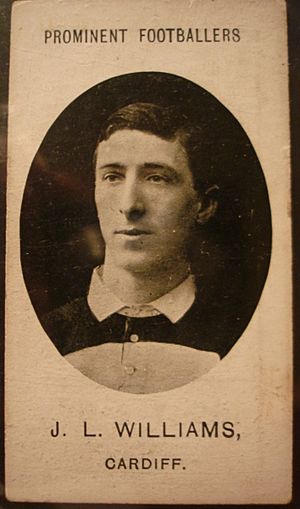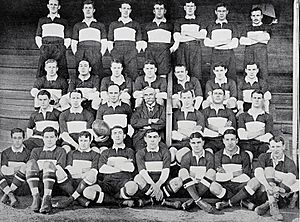Johnny Williams (rugby union, born 1882) facts for kids

Williams in Cardiff jersey
|
|||||||||||||||||||||||||||||||||||||||||
| Birth name | John Lewis Williams | ||||||||||||||||||||||||||||||||||||||||
|---|---|---|---|---|---|---|---|---|---|---|---|---|---|---|---|---|---|---|---|---|---|---|---|---|---|---|---|---|---|---|---|---|---|---|---|---|---|---|---|---|---|
| Date of birth | 3 January 1882 | ||||||||||||||||||||||||||||||||||||||||
| Place of birth | Whitchurch, Wales | ||||||||||||||||||||||||||||||||||||||||
| Date of death | 12 July 1916 (aged 34) | ||||||||||||||||||||||||||||||||||||||||
| Place of death | Corbie, France | ||||||||||||||||||||||||||||||||||||||||
| Height | 5 ft 8+1⁄2 in (174.0 cm) | ||||||||||||||||||||||||||||||||||||||||
| Weight | 11 st (70 kg) | ||||||||||||||||||||||||||||||||||||||||
| School | Cowbridge Grammar School | ||||||||||||||||||||||||||||||||||||||||
| Rugby union career | |||||||||||||||||||||||||||||||||||||||||
|
|||||||||||||||||||||||||||||||||||||||||
| ---- | |||||||||||||||||||||||||||||||||||||||||
| Military career | |||||||||||||||||||||||||||||||||||||||||
| Buried |
Corbie Communal Cemetery Extension
|
||||||||||||||||||||||||||||||||||||||||
| Allegiance | |||||||||||||||||||||||||||||||||||||||||
| Service/ |
|||||||||||||||||||||||||||||||||||||||||
| Rank | Captain | ||||||||||||||||||||||||||||||||||||||||
| Battles/wars | First World War | ||||||||||||||||||||||||||||||||||||||||
John Lewis Williams (born January 3, 1882 – died July 12, 1916) was a famous Welsh rugby player. He played as a wing for the Cardiff Rugby Football Club. Johnny was an amazing player for the Welsh national team. He won the Triple Crown three times. Out of 17 games for Wales, his team only lost twice!
Williams started his top-level rugby career with Newport RFC from 1899 to 1903. He then moved to Cardiff and joined Cardiff RFC, where he played for the rest of his career. In 1906, he was chosen to play for Wales. He continued to play for Wales until 1911, becoming the country's highest points scorer. After retiring from rugby, he joined the army for World War I. He was hurt during the Battle of the Somme and sadly passed away in France on July 12, 1916.
Contents
Early Life and School Days
John Lewis Williams was born in 1882 in Whitchurch, Glamorgan, Wales. His father was Edward Lewis Williams. Johnny went to Cowbridge Grammar School. Interestingly, he played association football (soccer) at school, not rugby!
Johnny's Rugby Career
Starting His Rugby Journey
After school, Johnny switched from football to rugby. He started playing for his local team, Whitchurch Village rugby club. From the very beginning, he played as a left wing.
In 1899, Johnny was asked to join Newport RFC. The team had lost some players, and Johnny helped fill the gaps. In his first season at Newport, the team scored many more points than before. The next season was one of Newport's best ever. Even though Johnny got injured that year, his skills were clear. He scored a try after a "grand run" in one game.
Joining Cardiff RFC
Johnny moved to Cardiff for work and joined Cardiff RFC. Here, he formed a fantastic partnership with Rhys Gabe, who played at left centre. In their first season (1903–04), they each scored ten tries! The next year, Johnny was Cardiff's top try scorer with 16 tries.
In the 1905–06 season, Cardiff had an amazing run. They were undefeated except for one game against the famous touring All Blacks team from New Zealand. Johnny played for London Welsh RFC on the same day Wales beat New Zealand. Later, Cardiff played the All Blacks on Boxing Day 1905. It was a close game, but Cardiff lost 10-8. Johnny was again Cardiff's top try scorer that season, scoring a huge 35 tries!
Becoming a Welsh International
By 1906, Johnny Williams was seen as one of the best wings in all of the UK. People admired his speed, clever dodging, and strong runs. So, on December 1, 1906, he earned his first cap (played his first game) for Wales against South Africa. Wales lost this game, which was their first home defeat in 11 years.
A month later, Cardiff played the South Africans and won 17–0. The field was very muddy due to heavy rain. Johnny had a chance to score early but fumbled the ball. Later, he got the ball from Rhys Gabe. He faced Marsberg, the opposition's fullback, who was known for his great tackling. Johnny used a clever swerving run to get past Marsberg and score a try in the corner! Marsberg even shook his hand to show respect for the move.
Johnny then played for Wales against England on January 12, 1907. Many people expected Wales to lose, and only 5,000 fans showed up. But Wales surprised everyone and won 22–0! Johnny scored two tries in this game. His teamwork with Rhys Gabe was excellent.
The next game against Scotland was a loss for Wales. However, the Williams–Gabe partnership still played well. Against Ireland on March 9, Wales won easily, 29–0. Many of the points came from Cardiff players. Johnny scored three tries in this game and almost got a fourth! His partnership with Gabe was key to Wales's big win.
Johnny was Cardiff's top try scorer again in 1906–07, scoring 19 tries.
Unbeaten Seasons and Touring
Wales had two amazing unbeaten seasons in 1908 and 1909. At the end of the 1907–08 season, Johnny was again Cardiff's top try scorer with 13 tries. He then joined the Anglo-Welsh team (a team of English and Welsh players) that toured New Zealand and Australia in 1908. Even though the tour wasn't very successful for the team, Johnny played well and scored the most tries for his team.
He missed the start of the 1908–09 season but returned to Cardiff in November. Cardiff played Australia on December 28, 1908, and won 24–8, with Johnny scoring two tries. Cardiff finished that season as Welsh Champions.
Captaining Cardiff and Final Games
Johnny Williams was the captain of Cardiff in the 1909–10 season. They won 22 out of 36 games. Johnny scored 13 tries that season.
In 1910, Johnny was chosen as a reserve for Wales against England. However, he got a thigh injury playing for Cardiff, which kept him out for a few weeks. Later, he was called up to play for Wales against Ireland on March 12, 1910. The Welsh team had many Cardiff players. Ireland was leading at half-time, but Johnny scored a try to tie the game. In the second half, he scored two more tries! He was praised for his "splendid" skill in beating several Irish players to score.
The next season, Johnny scored 27 tries for Cardiff. He also captained Wales against France, as he could speak French. Johnny retired from playing rugby at the end of the 1910–11 season.
Johnny's Amazing Rugby Records
Johnny Williams was part of three Welsh teams that won the Triple Crown. This means they beat all the other home nations (England, Ireland, and Scotland) in the Five Nations Championship. In his 17 games for Wales, he only lost two matches and scored an impressive 17 tries!
International Matches Played
| Opposition | Score | Result | Date | Venue | Ref(s) |
|---|---|---|---|---|---|
| 0–11 | Lost | 1 December 1906 | Swansea | ||
| 22–0 | Won | 12 January 1907 | Swansea | ||
| 6–3 | Lost | 2 February 1907 | Inverleith | ||
| 29–0 | Won | 9 March 1907 | Cardiff | ||
| 18–28 | Won | 18 January 1908 | Bristol | ||
| 6–5 | Won | 1 February 1908 | Swansea | ||
| 5–11 | Won | 14 March 1908 | Belfast | ||
| 9–6 | Won | 12 December 1908 | Cardiff | ||
| 8–0 | Won | 16 January 1909 | Cardiff | ||
| 3–5 | Won | 6 February 1909 | Inverleith | ||
| 5–47 | Won | 23 February 1909 | Colombes | ||
| 18–5 | Won | 13 March 1909 | Swansea | ||
| 3–19 | Won | 12 March 1910 | Lansdowne Road | ||
| 15–11 | Won | 21 January 1911 | Swansea | ||
| 10–32 | Won | 4 February 1911 | Inverleith | ||
| 0–15 | Won | 28 February 1911 | Parc des Princes | ||
| 16–0 | Won | 11 March 1911 | Cardiff |
Military Service and Legacy
After his incredible rugby career, Johnny Williams bravely fought for his country in the First World War. He joined the Royal Fusiliers in September 1914. He quickly rose through the ranks, becoming a captain by March 1915.
His army unit was sent to the Western Front in France in December 1915. They took part in the terrible Battle of the Somme, which began on July 1, 1916. On July 7, Johnny was leading his men in an attack when he was wounded. He was taken to a medical station but sadly died from his injuries on July 12, 1916.
Johnny Williams is buried in the Corbie Communal Cemetery Extension in France. He was married to Mabel.
See Also
- List of international rugby union players killed in action during the First World War
 | Audre Lorde |
 | John Berry Meachum |
 | Ferdinand Lee Barnett |


